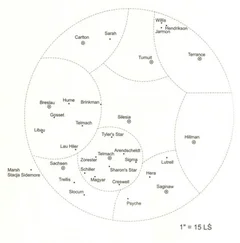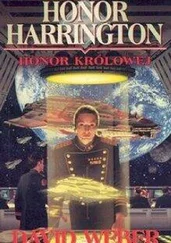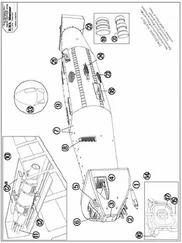David Weber - More Than Honor
Здесь есть возможность читать онлайн «David Weber - More Than Honor» весь текст электронной книги совершенно бесплатно (целиком полную версию без сокращений). В некоторых случаях можно слушать аудио, скачать через торрент в формате fb2 и присутствует краткое содержание. Жанр: Фантастика и фэнтези, на английском языке. Описание произведения, (предисловие) а так же отзывы посетителей доступны на портале библиотеки ЛибКат.
- Название:More Than Honor
- Автор:
- Жанр:
- Год:неизвестен
- ISBN:нет данных
- Рейтинг книги:3 / 5. Голосов: 1
-
Избранное:Добавить в избранное
- Отзывы:
-
Ваша оценка:
- 60
- 1
- 2
- 3
- 4
- 5
More Than Honor: краткое содержание, описание и аннотация
Предлагаем к чтению аннотацию, описание, краткое содержание или предисловие (зависит от того, что написал сам автор книги «More Than Honor»). Если вы не нашли необходимую информацию о книге — напишите в комментариях, мы постараемся отыскать её.
More Than Honor — читать онлайн бесплатно полную книгу (весь текст) целиком
Ниже представлен текст книги, разбитый по страницам. Система сохранения места последней прочитанной страницы, позволяет с удобством читать онлайн бесплатно книгу «More Than Honor», без необходимости каждый раз заново искать на чём Вы остановились. Поставьте закладку, и сможете в любой момент перейти на страницу, на которой закончили чтение.
Интервал:
Закладка:
When the transition finally occurred, there were several very unfortunate instances in which unscrupulous operators used the new hyper sail technology to pass hibernation ships en route to their new homes. When the original colonists arrived, it was only to find well-established (and armed) claim-jumpers already squatting on their planned home worlds. If there was an already established colony in the vicinity, it might take a hand to assist the original colonists, even to the extent of lending military aid to eject the claim-jumpers, in order to discourage such unsavory elements from ruining the neighborhood. If there was no such well-inclined planet in the vicinity, the original colonists were out of luck, particularly since their technology might be several centuries less advanced than that of the thieves they confronted. In some cases, this created a domino effect. Expeditions which found themselves dispossessed of their colony sites often lacked the resources to return whence they had come (even if they had the inclination) and many opted to risk settling an unsurveyed world if there were stars with habitable planets (or which were likely to have such planets) in the vicinity. Many of them came to grief as the old generation ship colonies had in attempting to settle worlds other than the ones they had planned their original expedition's equipment list to meet, and those which did not often wound up displacing yet another group of legitimate colonists. Other such instances ended far more happily, with the second group of settlers discovering a world which was already partly settled and a group of "squatters" who paid their own way with the improvements they had already made and were integrated peaceably into the ranks of the "legitimate" colonists.
With the advent of Icarus and her later sisters, however, the entire pattern of colonization shifted. It was now possible to make a 500 light-year voyage in barely two-and-a-half years, an interval which dropped steadily as improvements in Warshawski technology became available. Hibernation was still used on most colony ships, but now it was simply to cram in the largest possible number of passengers, not a necessity. Indeed, as higher and higher speeds became possible, the hibernation features began to fall by the wayside.
(4) The Star Kingdom of Manticore
The original colony expedition to Manticore departed Old Earth on October 24, 775 pd, aboard the sublight hibernation ship Jason for the Manticore Binary. Manticore, approximately 512 light-years from Earth, was a G0/G2 distant binary first confirmed to have planets in 562 pd, by the astronomer Sir Frederick Clarke. Its distance from Sol was such that the voyage would take 640.5 years (just over 384 subjective years), requiring that each colonist be waked for exercise seven times. Accordingly, the colonists were investing about 4.5 years of their lives (and all of their money) in the voyage.
Sixty percent of the colonists were Western Europeans, with most of the remainder drawn from the North American Federation, the Caribbean, and a very small minority of ethnic Ukrainians. The total expedition consisted of 38,000 adults and 13,000 minor children, and the "rights" to the system had been purchased at auction from the survey firm of Franchot et Fils, Paris, France, Old Earth. "FF" (as it was known) had a high reputation, and its survey ship Suffren had made the same voyage in just twenty years. Suffren 's crew had done FF's usual, professional job, although, of course, all data was accompanied by the caution that it would be 650 years out of date when the colonists arrived, and FF sold its rights in the Manticore System to the Manticore Colony, Ltd., for approximately 5.75 billion EuroDollars. As part of the transfer of rights, FF expunged all data on the system from its memory banks, transferring the information to the Federal Government of Earth's World Data Bank's maximum security files. This was a standard safeguard to protect Manticore Colony against the occupation of the planet by later expeditions with faster ships, as it was already apparent that advances in hyper travel might well make such protection necessary, yet it was also recognized that there was no way to guarantee that faster, more capable hyperships would not beat the colonists to Manticore. Accordingly, Roger Winton, President and CEO of Manticore Colony (already elected first Planetary Administrator) opted to establish the Manticore Colony Trust of Zurich.
The MCT's purpose was to invest all capital remaining to the MC after mounting the expedition (something under one billion EuroDollars) and use the accrued interest to watch over the colonists' rights to their new home. It was a wise precaution, for when Jason finally arrived in the Manticore System on March 21, 1416 pd, her crew discovered a modest settlement on the planet they christened Manticore, but it was staffed by MCT personnel who also manned the four small Earth-built frigates protecting the system against claim-jumpers. Indeed, so well had the Trust done in the last six centuries that Manticore found itself with a very favorable bank balance, and the frigates became the first units of the Manticoran System Navy (later the Royal Manticoran Navy). Moreover, the small MCT presence on Manticore included data banks and carefully selected instructors assigned to update the colonists on the technical advances of the last six centuries. This last was a feature even Winton had not anticipated, and he had very good reason to be pleased both with his own decision and the diligence, foresight, and imagination with which a succession of MCT managers had discharged their duties.
It was as well that the colony had such unusual support and off-world financial strength, however, for after almost forty years in which things went perfectly, disaster struck Manticore in 1454.
The initial bid for Manticore had been so high for two reasons. One was that the G0/G2 binary was highly unusual—indeed, unique—in having no less than three planets suitable for human life. The second was that Manticore and Sphinx, the two Earth-like planets orbiting the G0 stellar component, were extremely Earth-like. Although each had its own unique biosphere, survey reports indicated that terrestrial life forms would find it unusually easy to adapt to all three, and so, indeed, it proved. Terran food crops did well, and while the local flora and fauna could not provide all essential dietary elements, much of it was digestible by the terrestrial visitors. Terraforming requirements thus were extraordinarily modest, consisting of little more than the need to seed food crops and selected terrestrial grasses to support imported herbivores. Unfortunately, that very ease of adaptation had a darker side, and Manticore proved one of the very few extra-terrestrial systems to possess microorganisms which could (and did) prey on humans.
The culprit was a virus—or, rather, a small family of viruses—which had been missed by the original survey team. Some virologists argue that it was not, in fact, missed but rather evolved in the six centuries between the initial survey and the arrival of the colonists. Still others suggest that it was actually the mutated descendant of a virus the colonists had brought with them from Old Earth. Whatever the truth of the matter, the virus was deadly, producing a condition analogous to virulent influenza and pneumonia simultaneously in its victims. Worse, it proved resistant to all existing medical technology, and ten years were to pass before a successful vaccine was found.
In that decade, almost sixty percent of the original colonists died. Their Manticore-born children fared better against the disease, experiencing a generally less violent manifestation of it, yet without the cushion provided by the MCT funds on Old Earth and the evolution of the Warshawski Sail hypership, the entire expedition would no doubt have come to grief.
Читать дальшеИнтервал:
Закладка:
Похожие книги на «More Than Honor»
Представляем Вашему вниманию похожие книги на «More Than Honor» списком для выбора. Мы отобрали схожую по названию и смыслу литературу в надежде предоставить читателям больше вариантов отыскать новые, интересные, ещё непрочитанные произведения.
Обсуждение, отзывы о книге «More Than Honor» и просто собственные мнения читателей. Оставьте ваши комментарии, напишите, что Вы думаете о произведении, его смысле или главных героях. Укажите что конкретно понравилось, а что нет, и почему Вы так считаете.












